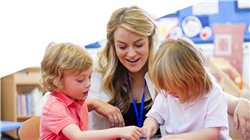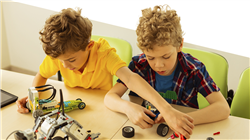University certificate
The world's largest faculty of education”
Introduction to the Program
Thanks to this Postgraduate diplomayou will be part of the new era of Education, offering a quality, personalized education focused on being as effective and creative as possible"

In the field of education there are different studies, reports and works that conceive modern pedagogy as something that goes beyond format, theory/practice and memory. The Delors Report, for example, focuses on the importance of understanding education as a whole, understanding that the foundations of education are based on four pillars: learning to know, learning to do, learning to live and learning to be. In this way, a 360-degree education is achieved, where the individual can evolve and develop in multiple directions.
Looking for this new format that is becoming more and more popular, educators must have sufficient knowledge to be able to apply the methods and tools of greater educational depth, so that they can attend to each student with the dedication, assertiveness and efficiency necessary for a complete education.
With this objective as its main goal, TECH has created this program in Emotional and Creative Education, with which graduates will be able to go through different modules where they will learn each and every one of the keys to specialized teaching, delving into innovative methodologies, concepts such as positive psychology in the classroom or various strategies for the development of creativity. Likewise, special emphasis will be placed on the practical application of all this knowledge, combining theory and real cases throughout the syllabus.
In addition to this, TECH's Relearning teaching system enables the possibility of learning gradually, without sacrifices and in a totally adaptable way. With this, enrolled students will be able to access all theoretical and practical material remotely and without geographical limitations, thus being able to combine their professional and academic lives.
Understanding a student's emotions will, as a teaching professional, make for a more complete and effective education, giving a vital boost to your career”
This Postgraduate diploma in Emotional and Creative Education contains the most complete and up-to-date educational program on the market. The most important features include:
- The development of case studies presented by experts in Education focused on Emotional and Creative Education
- The graphic, schematic and practical contents of the book provide theoretical and practical information on those disciplines that are essential for professional practice
- Practical exercises where the self-assessment process can be carried out to improve learning
- Its special emphasis on innovative methodologies
- Theoretical lessons, questions to the expert, debate forums on controversial topics, and individual reflection assignments
- Content that is accessible from any fixed or portable device with an Internet connection
Become a reference in Emotional Education and start implementing an innovative pedagogy in your daily professional life"
The program’s teaching staff includes professionals from sector who contribute their work experience to this program, as well as renowned specialists from leading societies and prestigious universities.
Its multimedia content, developed with the latest educational technology, will provide the professional with situated and contextual learning, i.e., a simulated environment that will provide an immersive education programmed to learn in real situations.
The design of this program focuses on Problem-Based Learning, by means of which the professional must try to solve the different professional practice situations that are presented throughout the academic course. For this purpose, the student will be assisted by an innovative interactive video system created by renowned and experienced experts
Deepen your theoretical and practical knowledge about innovation and creativity and start applying teaching methodologies based on art, music and even robotics"

Understand your students so that they are involved in their own learning. With this 450-hour program you will know how and in what ways to achieve it"
Why study at TECH?
TECH is the world’s largest online university. With an impressive catalog of more than 14,000 university programs available in 11 languages, it is positioned as a leader in employability, with a 99% job placement rate. In addition, it relies on an enormous faculty of more than 6,000 professors of the highest international renown.

Study at the world's largest online university and guarantee your professional success. The future starts at TECH”
The world’s best online university according to FORBES
The prestigious Forbes magazine, specialized in business and finance, has highlighted TECH as “the world's best online university” This is what they have recently stated in an article in their digital edition in which they echo the success story of this institution, “thanks to the academic offer it provides, the selection of its teaching staff, and an innovative learning method aimed at educating the professionals of the future”
A revolutionary study method, a cutting-edge faculty and a practical focus: the key to TECH's success.
The most complete study plans on the university scene
TECH offers the most complete study plans on the university scene, with syllabuses that cover fundamental concepts and, at the same time, the main scientific advances in their specific scientific areas. In addition, these programs are continuously being updated to guarantee students the academic vanguard and the most in-demand professional skills. In this way, the university's qualifications provide its graduates with a significant advantage to propel their careers to success.
TECH offers the most comprehensive and intensive study plans on the current university scene.
A world-class teaching staff
TECH's teaching staff is made up of more than 6,000 professors with the highest international recognition. Professors, researchers and top executives of multinational companies, including Isaiah Covington, performance coach of the Boston Celtics; Magda Romanska, principal investigator at Harvard MetaLAB; Ignacio Wistumba, chairman of the department of translational molecular pathology at MD Anderson Cancer Center; and D.W. Pine, creative director of TIME magazine, among others.
Internationally renowned experts, specialized in different branches of Health, Technology, Communication and Business, form part of the TECH faculty.
A unique learning method
TECH is the first university to use Relearning in all its programs. It is the best online learning methodology, accredited with international teaching quality certifications, provided by prestigious educational agencies. In addition, this disruptive educational model is complemented with the “Case Method”, thereby setting up a unique online teaching strategy. Innovative teaching resources are also implemented, including detailed videos, infographics and interactive summaries.
TECH combines Relearning and the Case Method in all its university programs to guarantee excellent theoretical and practical learning, studying whenever and wherever you want.
The world's largest online university
TECH is the world’s largest online university. We are the largest educational institution, with the best and widest online educational catalog, one hundred percent online and covering the vast majority of areas of knowledge. We offer a large selection of our own degrees and accredited online undergraduate and postgraduate degrees. In total, more than 14,000 university degrees, in eleven different languages, make us the largest educational largest in the world.
TECH has the world's most extensive catalog of academic and official programs, available in more than 11 languages.
Google Premier Partner
The American technology giant has awarded TECH the Google Google Premier Partner badge. This award, which is only available to 3% of the world's companies, highlights the efficient, flexible and tailored experience that this university provides to students. The recognition as a Google Premier Partner not only accredits the maximum rigor, performance and investment in TECH's digital infrastructures, but also places this university as one of the world's leading technology companies.
Google has positioned TECH in the top 3% of the world's most important technology companies by awarding it its Google Premier Partner badge.
The official online university of the NBA
TECH is the official online university of the NBA. Thanks to our agreement with the biggest league in basketball, we offer our students exclusive university programs, as well as a wide variety of educational resources focused on the business of the league and other areas of the sports industry. Each program is made up of a uniquely designed syllabus and features exceptional guest hosts: professionals with a distinguished sports background who will offer their expertise on the most relevant topics.
TECH has been selected by the NBA, the world's top basketball league, as its official online university.
The top-rated university by its students
Students have positioned TECH as the world's top-rated university on the main review websites, with a highest rating of 4.9 out of 5, obtained from more than 1,000 reviews. These results consolidate TECH as the benchmark university institution at an international level, reflecting the excellence and positive impact of its educational model.” reflecting the excellence and positive impact of its educational model.”
TECH is the world’s top-rated university by its students.
Leaders in employability
TECH has managed to become the leading university in employability. 99% of its students obtain jobs in the academic field they have studied, within one year of completing any of the university's programs. A similar number achieve immediate career enhancement. All this thanks to a study methodology that bases its effectiveness on the acquisition of practical skills, which are absolutely necessary for professional development.
99% of TECH graduates find a job within a year of completing their studies.
Postgraduate Diploma in Emotional and Creative Education
Immerse yourself in the world of emotional education with this high quality Postgraduate Diploma. The importance of TECH's Postgraduate Diploma in Emotional and Creative Education academic program lies in the need to provide education professionals with the necessary tools to foster and develop emotional and creative skills in students. Today, education is facing several challenges, such as increased stress and anxiety in students, lack of motivation and difficulty in creative problem solving. These challenges can affect not only academic performance, but also the emotional well-being of students. Emotional education refers to the ability to recognize and manage one's own and others' emotions, as well as to develop social and empathy skills. Scientific evidence has shown that emotional education contributes to improving academic performance, reducing behavioral problems, increasing self-esteem and promoting students' mental well-being.
Get educated in TECH and add value to your resume
The Postgraduate Diploma in Emotional and Creative Education program seeks to fill this gap in the training of education professionals, providing them with the knowledge and strategies necessary to cultivate the emotional and creative skills of their students. Through this program, participants will learn to identify and understand emotions, develop emotional regulation strategies, promote a positive and respectful learning environment, foster resilience and lead creative processes. Topics such as the importance of effective communication, conflict resolution and stress management in the educational environment will also be addressed. In conclusion, the Postgraduate Diploma in Emotional and Creative Education is a vital academic program for education professionals, as it provides them with the necessary tools to promote emotional well-being and enhance the creativity of their students. Enroll in TECH and study 100% online!







